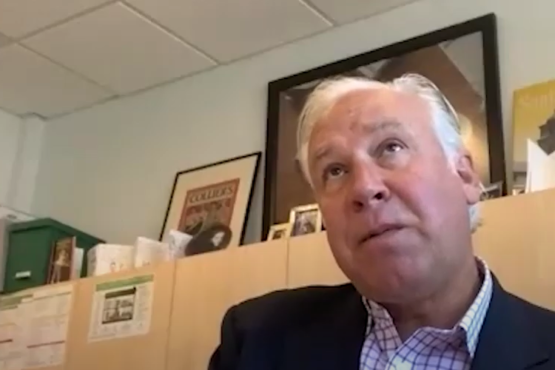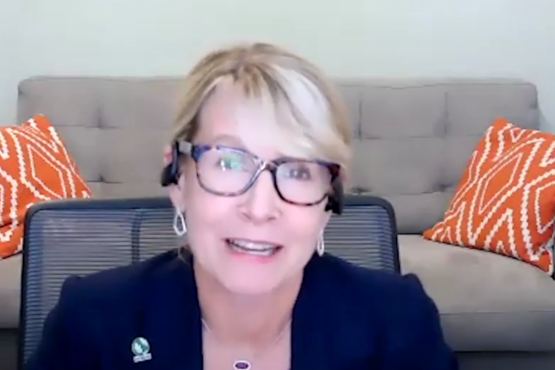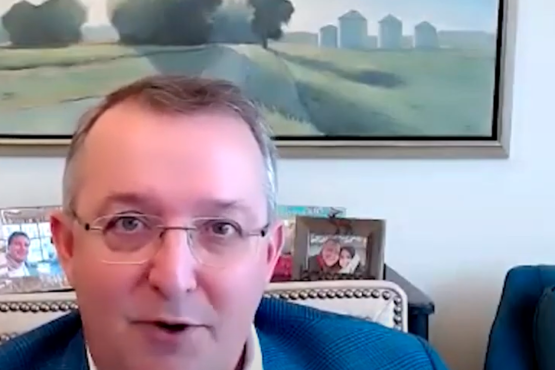Seema Verma is the Administrator for CMS, the Centers for Medicare and Medicaid Services. She oversees the federal agency that provides vital healthcare programs to over 100 million Americans. There, she is aggressively pushing regulatory change to reduce administrative burdens on providers and improve transparency and outcomes for patients. I’m your host, Senator Bill Frist. We are broadcasting from the Lake Nona Impact Forum in Lake Nona Medical City, Florida.
Seema Verma: … I think they like their doctors, they like the high quality care that they’re getting. They’re frustrated with how the system works and they’re scared about the cost of healthcare. Nobody wants to go bankrupt over their healthcare bills.
Senator Bill Fr…: You’re listening to A Second Opinion, your trusted source engaging at the intersection of policy, medicine and innovation and rethinking American health. Seema Verma is the Administrator for CMS, the Centers for Medicare and Medicaid Services. She oversees the federal agency that provides vital healthcare programs to over 100 million Americans. There, she is aggressively pushing regulatory change to reduce administrative burdens on providers and improve transparency and outcomes for patients. I’m your host, Senator Bill Frist. We are broadcasting from the Lake Nona Impact Forum in Lake Nona Medical City, Florida. Welcome to A Second Opinion.
Senator Bill Fr…: One of the things that I love about your style coming in and I hate to start with a very serious substance to talk about style, but is that you like when you’re out and about in doing the talk, some are obligatory and all of them are very important but doing some other things and really seeing what’s out there. And I understand earlier today is you were with medical students, so what’s it like? I mean here’s somebody from the administration, it’s on the forefront doing lots of reform but doing it in a way that is probably much more aggressive and fast-paced than at anytime in the past from that branch of the government and then you go into a room with medical students, what did you find?
Seema Verma: Well, I’ll start with saying that I’m an outsider. I’m not from DC. I spent my whole life in the private sector working with government, working with frontline providers. And so when you come at it from that standpoint, you have a sense of what it’s like to be a hospital administrator and the pains that they have. Right? I mean they’re trying to deal with patients in their emergency room, right? They don’t want to deal with all of this regulation, government healthcare, government that doesn’t understand what they need.
Seema Verma: So it was great to talk to medical students and really talk to anybody that’s on the frontlines because I think that as much as I’ve learned at my time at CMS, I’ve learned a lot about policy. We have a wonderful team, great career staff, but a lot of what informs the policymaking was before I came to CMS. It’s the frontline experience. It’s talking to people, understanding the challenges that they’re facing. And just because I’m now in DC, I don’t want to lose that connection to the healthcare industry.
Seema Verma: And I think it’s important that we spend time listening and you have a better sense of if you are making policy changes, well what is the impact? How are they feeling it and what do you need to do to make it better and to consistently and constantly be listening because that’s informing the next change that you’re going to make. Here are the problems. But if you’re just stuck in your office in DC or in Baltimore, you don’t understand what the real problems are.
Senator Bill Fr…: Yeah. And so when you’re out on the road talking, you do make a run. Now you did just discuss reputation. And then the question is you get to know are hugely broad, but you have accomplished so much as I have implied earlier. If you look back just over the last year, how would you sort of list, and you don’t have to prioritize, but in thinking through it, sort of the four or five big things that will have a lasting impact and transforming the system, modifying this system, making it more seamless?
Seema Verma: Well, I think that when we came into office, the president was very clear about I want to lower costs and make things more affordable and give our patients more choices. And I think we’ve done that. Look at Medicare and the Medicare program, premiums are at a 13-year low. Right? So where in healthcare do you see prices go back? Well, it’s happening in Medicare Advantage. In the Part D programs, seven-year low in terms of premiums. In the individual market, when we came into office, we inherited a market and chaos. Double digit rate increases every single year and we’ve been able to put out new regulations and we’ve actually seen prices go down again. We’ve seen stabilization of the marketplace premiums down 4% just this past year on average. And in some cases we’re seeing double digit rate decreases. So that sort of represents the output of all of the policy changes.
Seema Verma: But I think there are probably a couple that I would say that I think are going to be the most significant and maybe a legacy for this administration. The first one is interoperability and what we’re doing for patient records. I always tell folks that I kind of got it. I’ve heard about interoperability. You know, we had gone to the frontlines, we heard about from doctors, how frustrated they were with their electronic health records, but it didn’t really hit home for me until I experienced it myself. And I tell this story because I think it describes the problems with the healthcare system.
Seema Verma: So I’m in Boston and I had been with my family, they’re going back home to Indiana. My daughter calls me from the Philadelphia Airport and she says, “Mom, dad passed out.” And she’s in a panic again on the phone. And the paramedics say, your husband’s in cardiac arrest and he’s not breathing. Can we have your medical… What’s his history? What’s his background? Any allergies? And I got to tell you, I’ve got nothing. I don’t know all of this information. He’s a doctor. That’s just not information that I had and here’s a life and death situation. And luckily he survived. It took us a week of all kinds of tests to figure out what’s going on and leave the hospital. And I say, “Okay, well, got to go, can I get… You know, give me a copy of all the medical records and the tests.”
Seema Verma: And I remember the resident looking kind of, I almost saw that sort of panic look on his face. Like they had done such a great job, provided high-quality care. He survived. So they did everything right. But then at that last minute you could sort of see that pained look on his face and he hands me, he’s like, let me figure something out. He comes back and he gives me five sheets of paper and a CD-ROM, and the CD-ROM really only had one test on it. And you know these days the CD-ROM, my kids were sort of like, well what is this?
Senator Bill Fr…: Yeah, what is this thing?
Seema Verma: Because you know the computers don’t even… Yeah, a lot of them don’t even have it anymore. But it kind of really spoke to me as sort of the problems that we’re having with everyday patients are having that the federal government spent $36 billion so that our doctors and hospitals could have electronic health records. But really all we bought were electronic silos. Right. So you went from a filing cabinet and now you have a silo and you can see the everyday challenges in terms of quality and safety. Can you imagine, and I’m sure doctors go through this every day, that they’re trying to make a diagnosis, they have half of the information and that’s where we get into quality and safety issues.
Seema Verma: I think the other piece is if we look at this in terms of the speed of innovation and delivering better cures and treatments, well what does that look like when you have a complete medical record? Right? So if the medical record starts from birth through your entire life and in an era of artificial intelligence where we can rapidly analyze data, I think that’s going to speed up the cures and treatments that has paced that we’ve never seen before. And then I think in terms of what it does for the efficiency of the system, you know we’re talking about better coordinated care, more seamless care. I think there’s an opportunity by having all this data in a digital format to be able to when patients are being transferred from the hospital to post-acute care, that you have more information.

Seema Verma: The other thing this morning I learned about was how physicians are doing more telehealth, right? And telehealth in it of itself is enabled by having a complete medical record because you can deliver care in remote locations, which is very important to our rural communities. And the physicians can talk to each other because they’re talking from a common platform. They have all of the healthcare data right in front of them. So I think that’s going to be transformative if we can get there. And our administration has been focused on that.
Senator Bill Fr…: And I agree and I think that you and I have talked about telehealth and telemedicine and to enable that, the huge potential that is there, but what are the levers that can be pushed? And you mentioned huge amount of money has been spent in an attempt because everybody knows the value. They know the why. The how at this point, given the available levers that somebody such as yourself have, over the next three years to get to that point of a more seamless record. What levers do you have access to get there?
Seema Verma: Sure, and I’ll tell you what I mean, we’ve made a commitment. I’ve said publicly, we’re going to use every lever we can to drive interoperability. So we’ve changed meaningful use, right? We used to pay doctors and hospitals just to use an electronic health record and now we’re saying it’s now called promoting interoperability, right? Doctors are going to get penalized and doctors aren’t going to get their incentive payments unless they’re using the latest technology that allows them to share patient information. Patients own their data. It’s not the hospital, it’s not the doctor. It belongs to the patient. So those are some of the things that we’ve done right now.
Senator Bill Fr…: You say that easily, is like the patients own their data and as you know there are a lot of EHR-
Seema Verma: That’s right.
Senator Bill Fr…: … and companies proprietary and non-proprietary who would say no, no, no, no. So I think I stopped just because our listeners are really interested in the policy. But if you don’t start with certain fundamentals like that, it’s hard to develop policy or to innovate on that. So I just want to underscore the importance of that statement.
Seema Verma: Well no, I think you’re right because I hear a few people say, well we can’t share your data with you because of HIPPA or this, that and the other thing. And so we’re looking at all the regulations. Even in our Office of the National Coordinator, we have 21st century cures legislation that passed. So we’re changing all of the regulations in terms of the requirements for electronic health records, making it very clear to those companies that yes, you have to share data. Privacy and security has been brought up as an issue. We feel obviously very strongly about making sure patients’ data is protected and secure, but we shouldn’t use that as an excuse to hold patient data hostage.
Senator Bill Fr…: On the privacy issue, so the HIPAA, the Health Insurance Portability Act was on my watch and I was on the committee that that sort of went through in 1998 and that period of time and due to me, we wrote that before the Internet was used almost in any way for healthcare. And yet that is still what we’re operating under in terms of the privacy issues, which you know, people are afraid of that their data-
Seema Verma: Which is fair.
Senator Bill Fr…: … and that their most personal thing that once it goes in the cloud or once it goes somewhere, who has access to that? Right now Congress is not doing much of anything in terms of legislation. How much can you do on an issue like the privacy issues to reassure both the American people but also to be able to move it forward, like guarantee their privacy when you have the structure on another branch of government, the legislative branch frozen mainly for political reasons but frozen and we’re working under old legislation?
Seema Verma: Sure. Well I think you really hit it right on the head, which is that HIPAA doesn’t apply to these app developers. So if I share give… You know you’re a doctor, you give me online data, I’ve got it on my phone, but I decide I want to use an app to help me organize the data. Right there when you share it with an app, it’s not clear that HIPAA applies to the app. And so you know, this is a great thing where we’re seeing a lot of development for the private sector where the private sector is coming together and saying, okay, here are some operating guidelines that we should agree to. So when we started Blue Button 2.0 we said, okay, well we’re going to allow patients to share it with apps.
Senator Bill Fr…: And say just what Blue Button is, and I’m familiar with and you are.
Seema Verma: Oh, yes.
Senator Bill Fr…: It’s a fascinating program about, for our listeners, the fact that the government is leading on something like Blue Button would surprise them. So just really quickly.
Seema Verma: Sure. Well the idea is when we said patient data belongs to the patient, we said, all right, well let’s lead by example. And so Medicare obviously has all the claims’ data on our patients and we would share that with patients, but all they could really get out of us was the data and the format of a spreadsheet, which obviously doesn’t mean anything to anybody.
Senator Bill Fr…: Not useful. Not useful.
Seema Verma: So we changed our system to put it in an API format, which means that it can be then shared and used and analyzed by an app or however the patient wants to be able to whoever they want to share it with by putting it in an API format. So by doing that, we have all of these new apps that are available and there’s probably like 3000 apps that are being developed, Fit For Life, allowing patients to share their data with researchers. It helps them organize their medications, it gives them reminders. So with that, we put some guidelines together around privacy and security. You know, we told the app developers, if you want to participate in our program, here are the precautions that you need to take. You need to kind of be upfront with the patient about how you’re going to use their data.
Seema Verma: So in absence of a legislative solution, these are some of the things that we’ve done and I think that the private sector as well as coming up with their guidelines about how privacy or what should be sort of the standard for privacy and security with private companies. At the end of the day in absence of a legislative solution I think everybody has to be mindful about who they’re sharing their data with and then we have to, as a society ask how’s my data going to be used and make sure we understand that on the front end.
Senator Bill Fr…: This administration seems there is as much as any compared to any administration interaction between the public sector and private sector and absent things like revision of HIPAA, it seems like that is very important. But is that just me projecting that or is that true? It seems like there’s constantly interaction.
Seema Verma: I think it’s absolutely true and I think it kind of comes from at least my philosophical bent, right? I mean I came from outside DC, so I saw and I’ve always seen a lot of innovation, right? Innovation is happening at the local level and so when I think about how we’re moving forward, how we’re solving problems, I’m going back to innovators on the ground level to say, tell me what you’re doing and so we can enable that innovation to drive the healthcare system forward. This is what scares me about the discussions about government-run healthcare because in Medicare For All you would eviscerate the private sector and there wouldn’t be that innovation and then it would just be people in DC trying to figure out what to do.
Senator Bill Fr…: Yeah, let’s tell that just a little bit because yeah, the elections are underway and you and I get to stay out of the pure politics. I’ve had so really look at the substance, but you do have Medicare For All and you have a public option and I would think those issues will what it looks like they are going to rise even more and more to the surface in the campaigns. But beneath all of that, the implication of Medicare For All is what from from your perspective where you have Medicare and you have Medicaid and innovations, important to improve both of those because they’re not perfect, they’re not ideal. What does a Medicare For All do?
Seema Verma: Sure. Well, I’m going to look at it as ahead of the program, right? Head of Medicare, head of Medicaid, head of the exchanges. We’re living in government-run healthcare. What concerns me is from a broad perspective is let’s look at the government’s record on healthcare, right? If you say, well, let’s look at Medicare For All. Yes, people really like it. It’s a very popular program, but it is already not affordable to our country. The trustees say in six years we’re going to be running out of money on that program. That’s Medicare. Then if we go to Medicaid, number one, number two, budget item for every state, crowding out funding for roads and schools.
Senator Bill Fr…: Safety and schools.
Seema Verma: So we’re having trouble affording that program. We also have an aging baby boomer population. Medicaid pays for pretty much all of the nursing home care in America, most of it. And so our bill on Medicaid is going to increase dramatically. Our actuaries say by 2050 a 500% increase. So those are our two major programs that we have right now that the government has run and they’re not sustainable in their current format. So you know, government has a role with helping people, protecting people, but we also have to run sustainable programs. And to me we need to fix the programs that we have right now and make sure those can run properly.
Seema Verma: And the government hasn’t delivered that now. So to have discussions about having more government in our healthcare and from what I see, government has created a lot of the problems that we have. You know, the reason why we have high cost healthcare for example. And you talked about what did I think was sort of our main accomplishments. We’re trying to move to a more market-based system, but in our system today we don’t have price transparency, we don’t have quality transparency. And government has been a barrier to market-based reforms. Government policies, for example, we pay one doctor, pay a doctor less than we pay a hospital for the same service. And so that has created consolidation and monopolies in the marketplace.
Seema Verma: So to me, I’m just very cautious about thinking that government’s going to solve our problem because history has shown that they haven’t. Even with Obamacare, however you feel about Obamacare, the simple facts are premiums went up by over 100 to 200%, an average of 100%. so premiums went up and-
Senator Bill Fr…: It’s in the individual market.
Seema Verma: … It’s in the individual market. So we helped a lot of people, which is a good thing, but we’ve now also created a new class of uninsured. So Medicare For All, public option to me is a discussion of how much government do we want in our healthcare? Who do we want making decisions about our health care? Who do we trust? And I think we need to trust patients and doctors, not the government. Government shouldn’t be making decisions about our healthcare
Senator Bill Fr…: And the fear, having gone through this while I was in office and out of office, is that too much of the market, the vulnerable populations will not be protected or will suffer. And in the extremes, that may well be true. But when people come back and say, we like the element of markets which require accountability, quality measures, transparency, all the things that you’ve been very aggressive on, but the vulnerable populations themselves if we don’t have these protections then will suffer. What do you say to that?
Seema Verma: I think that if we’re going to protect vulnerable citizens and we create programs to help them, Medicaid and Medicare, we have an obligation. Government has an obligation to make sure that these programs are sustainable over the longterm and that they’re not a burden on the rest of society. Right? So the public option, for example, right? That’s also being touted as a potential solution. And in that option, we would essentially allow government to compete with the private market. So to me, that’s where you have the government is their role should be to be set the rules of the game, right? They’re the regulator, but you’re allowing the regulator to compete with the private market. So they’re basically going to make the rules that tip the scale in their favor.
Seema Verma: Government has been able to keep rates down because they pay providers less. And so in a public option, they would take the same approach, they would lower reimbursement for providers and that may make the premium go down, but providers still have to keep the lights on. So what that means is they’re going to increase rates for the rest of the private market and they’re cost-shifting essentially. And so the premiums go up for people that are in the private market, employer-based market. And so over time you erode the private market. And which is why I say that this public option is essentially a Trojan horse with a single payer inside because it starts out as a public option, but it’ll essentially result in the erosion of the entire private market. And then you’re just going to be stuck with a government program flow rate.
Senator Bill Fr…: And I think, and I agree. When we did Medicare Advantage and that was the first bill that when I became Majority Leader, it was the first bill that we pulled out and we did part in. We had Medicare Plus Choice at the time, which was probably four million people and reconfigure that and develop Medicare Advantage. But the big debate at that time was or areas where there weren’t private plan, should there be a public option? And we debated it. And does that same debate come up now if they’re not plans in an area that there has to be some sort of public option different than the public option than what we’re just talking about? Or is that not even a debate today?
Seema Verma: I think that a Medicare Advantage, by the way, is a terrific program. We’re seeing more and more seniors enroll in Medicare Advantage. And I like that program because it’s true competition, right? Or plans are competing on the basis of cost and quality. The government’s job is to set the rules of the game and make sure that we have a market that is competitive and in Medicare Advantage, that’s not a problem. We managed to have plans. 99% of our enrollees have plenty of choices of plans, so that’s an example. Great work on your part. It can work.
Senator Bill Fr…: Well it’s been so heavy, it has been hugely successful over a period of time, but it is a program that like everything else, we put it out there, you have to constantly be modifying it and that’s what I know you’re in the business of and let me run through just quickly sort of issues that are out there. You talked a little bit about Medicare. Medicaid on the table is is a way of taking care of people who may not be on the most vulnerable part of the populations through what in the newspapers in is called a or on the media is called a block grant. And where are we today in terms of the thinking? You might explain it a little bit in terms of the healthy adult option.
Seema Verma: So we think about the Medicaid program we sort of talked about its an enormous strain on state budgets, right? For me the larger issue is what are we doing for patients in that program? What are our outcomes? Is massive federal investment and what can we say for the program? We’re delivering 50% of the nation’s births and what are those birth outcomes? And the sad reality is we don’t even know because we don’t even require these states to report on quality outcomes. And we’re having all these conversations about value-based care and some of the folks that are promoting value-based care don’t want to bring that same concept to States, right? Which is to say, let’s set that budget, let’s agree. We’ll start with where you are, grow your budget at a sustainable growth rate, give you all the flexibility that you need. Get the federal government out of the way.
Seema Verma: Let states design programs, they’re tailored to the specific needs of their community. Let them address the social determinants of health, take the handcuffs off of them. And let them design programs, but then hold them accountable for delivering high-quality care. Set up, set forth here are the quality metrics. I think we just need a completely different paradigm in the Medicaid program.
Seema Verma: I don’t think it works. And I’ve been on both sides of it. Right? It doesn’t work to have States asking the federal government for permission every time they want to make a change in a program. And I’ve been on the State side of it and I’ve been on the federal side of it and it doesn’t work in its current format. It’s a large bureaucratic program and that it’s not clear it’s delivering the results that this population needs.
Senator Bill Fr…: And the changes over the next two to three years that you’d like to see happen in Medicaid and our listeners know this, but this is your real field of specialty before coming to government. But the changes you’d like to see over the next two to three years in Medicaid would be what?
Seema Verma: So I think for me it’s flexibility and giving the States more flexibility, accountability, holding them accountable. And the last one is program integrity. We’ve got to make sure that we’re running this program that so many people depend on in a sustainable way. You know, for people on this program, these are quadriplegics. These are individuals with you know, children with special needs, kids that have such severe cerebral palsy that they require 24-hour care. We must deliver for this population. They have no other place to turn. And to me it’s difficult when you hear that these populations are on a wait list for services or they can’t get the medications that they need. We have to run these programs better to deliver for that most vulnerable part of our community.
Senator Bill Fr…: And the federal government role of that because the States are, they get the money or they get half the money, about half the money, but they’re administering it. What is the leverage that you can use to ensure that program integrity?
Seema Verma: Program integrity. Yeah, well we’re putting out a lot of regulation. I think one of the areas that we see a lot of problems is around eligibility. Previous administration suspended it’s overviews of looking at eligibility and what we’re finding is that in some cases in some states, 20, 30% of the people aren’t actually eligible, but they’re on the program. And in that case we’re diverting resources from the most needy. So I think we need to do more on strengthening eligibility on the front end. And then I think there’s a lot of in terms of how the program is funded, states are required to make contributions, but I think there’s been a lot of oversight committees, whether the GAO, the Inspector General, Senate reports that are saying that this isn’t being funded the right way and it’s coming more for provider donations, which are prohibited by federal law.
Seema Verma: So we’ve put out some rules to at least ask for more transparency. We need to understand how the program’s being funded. If folks are not doing it in the right way, then giving them some time to get in line with the regulations. The idea here is that these programs have to be sustainable over the longterm. We obviously have an obligation to serve the people that are in the programs today, giving them high-quality accessible care, but we have to fashion these programs in a way that these programs can sustain themselves over the longterm so we can serve future generations. Whether it’s in Medicaid or in Medicare.
Senator Bill Fr…: In Medicare next three years changes, Medicare Advantage is growing, has continue you know, I think we both predict we’ll continue to grow. Any big changes in the Medicare that you would like to say or you think are important to say?
Seema Verma: Sure. So I think with Medicare Advantage that’s a great system of value, right? There is competition over cost and quality and there’s management of care and there’s incentives around value. What we don’t have in the majority of the program, the rest of the program is we don’t have any value-based care in large parts of the program in the traditional program. And so that’s why we’re experimenting with innovative payment models and value-based care and what we hope to do for those individuals that select it kind of a more open network. That even there that we still apply some of the principles around value-based care and improving and getting providers to focus on quality and lowering costs and we even create those incentives not just in Medicare Advantage but that we create them on the other side of the program as well.
Senator Bill Fr…: You know we use the word value-based care. We’ve used it for a long period of time which is interesting also because people say that administration is just totally different but value-based care, a lot of the fundamental started in the previous administration they continue. Blue Button, another in the previous administration. I think it’s good for the American people to hear that there are, there is continuity even among administration approaches being very, very different.
Senator Bill Fr…: If we take Medicare or we take Medicaid and then we take Medicare and then you have the whole value-based care which kind of overlaps all of that. The administration has been pretty aggressive in price transparency. If the value equation is price or cost on the denominator and the numerator is quality and outcome. We have been pretty aggressive and in terms of the price transparency and huge pushback among the hospitals and others. And then also, and it may be more recently, at least in my observation, it’s been on that to the numerator part of that equation, the quality and you’re doing a lot in terms of quality. Tell us just a little bit on both of those, transparency and the quality what you’re doing.
Seema Verma: Sure. So I think the concept is what I see, or when I came into office, you hear this incredible frustration from the American people, right? They’re upset with their healthcare system. I think they like their doctors, they like the high quality care that they’re getting, they’re frustrated with how the system works, and they’re scared about the cost of healthcare. Nobody wants to go bankrupt over their healthcare bills. You have some that are calling for more government to solve the problem and throw more money at the problem. What I’m trying to do, I hope is solve the problem, which is how do we create more affordable, accessible care? And there’s not a silver bullet that I have, but it’s a multi-pronged defense, multi-pronged strategy. But it starts with market base. So creating more competition.
Seema Verma: You can’t have a competitive marketplace until you have quality and price transparency. So the idea here is that we empower patients, we empower patients to make better decisions about their healthcare. They have this information. The interoperability piece is very important too because as they move around the healthcare system and they seek a high-value provider, they have their medical records so it’s easy for them. They’re not getting a good deal to go someplace else. So all of these pieces sort of come together to create a more market-based environment. But we are, you know price transparency’s a really big part of that. Definitely hearing from the naysayers but at the end of the day is how is it fair for patients to be left in the dark? Why do we give the bill on the back end? Everybody gets one of those explanation of benefits and EOB. It tells you what you have to pay and what the doctor got paid.
Senator Bill Fr…: Yeah impossible.
Seema Verma: It’s useless at the backend. Patients need that at the front end. And we hear from the naysayers because they think that there’s still parts, a large part of the healthcare system that wants to preserve the status quo, but it’s not working for patients-
Senator Bill Fr…: Well said.
Seema Verma: … and we’re going to have one change or the other, right? We’re either going to have more government or we’re going to have a more market-based solution. And that’s what we’re trying to do
Senator Bill Fr…: You know market implies that you need to know what you’re buying. And my good friend, professor Larry Van Horn back at Vanderbilt, he gets in these arguments and he’s a sort of libertarian out there and so he’ll argue with anybody and I love him and we worked together all the time. But at the end of the day he comes back to the principal. If you’re buying something, there’s a special to about to you and your family as hell and as close and as intimate and you’re buying it to say that you should not know the price of it or the cost of it is just unfathomable. He comes back to that every time. And then it kinds of sets everybody down. But it’s kind of interesting that you know.
Seema Verma: It just, it comes down to what patients want, you know? And I think that’s how the Trump administration and where the president is. Right? And one thing I really love about working in this administration is I’ve never gotten a call from the president that said, Oh, don’t do that because you’re going to make this group upset or that group upset. It’s always do what’s right for patients and do the right thing.
Senator Bill Fr…: That’s really true.
Seema Verma: And price transparency is what’s right for patients. And people have been talking about it for a long time, but it’s great to see that this president is trying to get it done.
Senator Bill Fr…: Well, I know we need to run, but there’s so many issues we could talk about and a lot of them, and I’m glad we had the conversation we did because a lot of them like drug pricing and surprise billing. They’ve got a life of their own and we don’t really know what’s going to happen so it’s fun to always surmise, but to be able to have a conversation with you about these more fundamental things like transparency and accountability in Medicaid and vulnerable population really means a lot. So thank you so much for doing this.
Seema Verma: Oh, my pleasure. Thanks for having me here.
Senator Bill Fr…: No, it’s a real pleasure and we really speak to you on behalf of a lot of people all around this country. Thanks for your tremendous service and bringing your experience.
Seema Verma: And thanks for yours as well. Thanks for leaving me with the great Medicare Advantage programs, so it’s a pleasure to run.
Senator Bill Fr…: Yeah, thank you so much. I appreciate it. You bet.
Seema Verma: Thank you so much. I appreciate it.
Senator Bill Fr…: Thank you.
Seema Verma: Thank you.
Senator Bill Fr…: This episode of A Second Opinion was produced by Todd Schlosser, the Modus Creative Group and Snapshot Interactive. You can subscribe to A Second Opinion on Apple Podcast, Spotify or wherever you’re listening right now. You can also watch our interviews on YouTube and on our website and be sure to rate and review A Second Opinion so we can continue to bring you great content. You can get more information about the show, it’s guests and sponsors at asecondopinionpodcast.com. A Second Opinion broadcast from Nashville, Tennessee, the nation’s Silicon Valley of health services, where we engage at the intersection of policy, medicine, and innovation.





